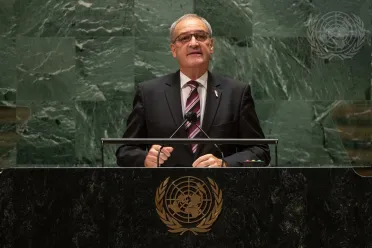Statement
Statement summary
GUY PARMELIN, President of Switzerland, calling the pandemic a human, social and economic catastrophe, underscored that the international community must anticipate crises, be prepared to deal with them and show solidarity in order to build a resilient world. To this end, his country was hosting the next United Nations World Data Forum in Bern in October. He also emphasized that the role of research, education and vocational training, especially for girls and women, must be at the heart of accessing knowledge, promoting innovation and enabling action. The United Nations was the forum for knowledge and resources, he said, highlighting the importance of global solidarity and common solutions when a crisis affected entire regions, or even the planet.
He went on to urge Member States to continue defending rules-based multilateralism, underlining Switzerland’s commitment to reforms aimed at improving conflict prevention, strengthening the United Nations development system, and modernizing management methods. “Twenty years after joining the United Nations, we are ready to contribute to the work of the UN Security Council for the 2023‑2024 term,” he stated.
In order to defeat the pandemic, vaccines must be accessible to everyone in the world, he continued, adding that Switzerland was committed to ensuring fair and affordable access to vaccines, treatments and diagnostics. Further, there was a need to strengthen resilience of the international value chains without resorting to protectionist measures. He also noted that the legal framework for international trade must work to enhance legal certainty, with the World Trade Organization (WTO) having a key role to play in this regard.
Technological developments and digitalization offered solutions to many of the challenges the world collectively had face, he said, highlighting his delegation’s work in the General Assembly to promote responsible State behaviour and the application of international law in cyberspace. In addition, Member States must take climate change seriously, he stressed, calling on all countries to aim for climate neutrality by 2050 at the latest and to submit ambitious climate targets for 2030.
In a polarized world, “it was more important than ever to return to dialogue”, he emphasized, recalling that Switzerland hosted the Libyan Political Dialogue Forum. That Forum resulted in the appointment of a Unified Executive Authority — a first for the country since 2014 — which was tasked with preparing national elections. Referring to Switzerland’s efforts to promote international law, he urged the Member States to follow Switzerland’s suit and prepare reports on the implementation of international humanitarian law. “Such reports enable States to assess their good practices and the challenges to be faced,” he noted.

